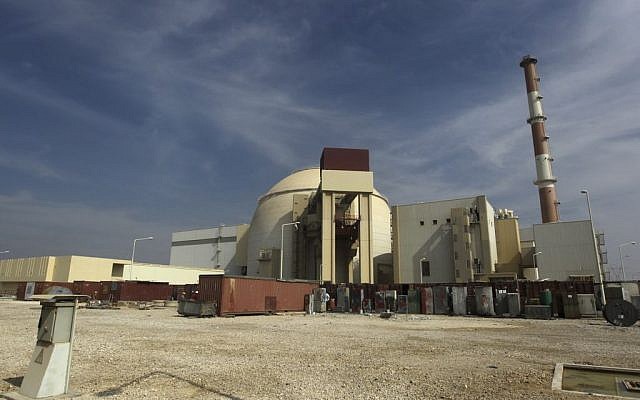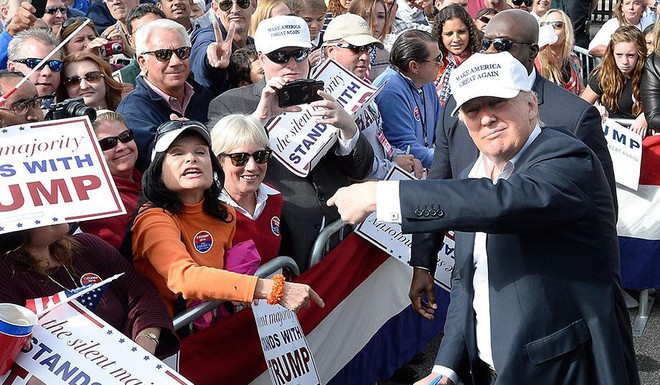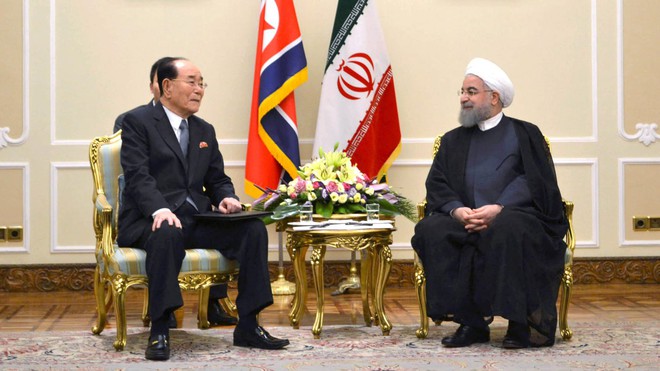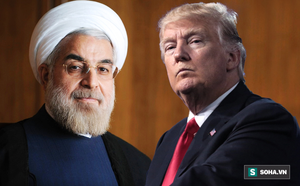In so doing, Trump promised to put "America First" and "Make America Great Again."
Abandoning the Iran nuclear weapons agreement was just the latest in a long list of policies Trump has overturned: curbing illegal immigration, repealing the Paris Climate agreement, deregulating business, pulling out of the Trans Pacific Partnership, rebuilding the military, instituting massive tax cuts, confronting China on trade, and getting tough on North Korea. All of these represent the fulfillment of Trump campaign promises.
So, no one should be surprised at Trump’s re-imposition of sanctions on Iran’s nuclear program and call to renegotiate the deal. Yet much of the world appears to be shocked!
Some Background
Why is Trump opposed to the nuclear agreement? Obama’s Secretary of State John Kerry led negotiations as part of a team comprised of Britain, France, Germany, the EU, Russia and China. In an effort to get the agreement, perhaps at any cost, Kerry was able to get Iran to suspend, but not abandon, its nuclear weapons program. Iran could, after 10 years more or less, restart the program.
In exchange for this concession, Kerry allowed Iran to continue to develop its ballistic missile program (upon which nuclear warheads would be launched) and to enrich uranium (which can be used to build weapons).
Kerry also made it difficult for UN weapons inspectors to monitor Iran’s compliance. Kerry also lifted regulations that previously prevented Iran from using the international banking system and engaging in various international commercial activities.
Kerry also returned $100 billion in funding taken from Iran for violating the nuclear weapons bans imposed by the US and UN. While still secret, leakers report that Kerry covertly transferred $1.7 billion to Iran in exchange for release of US hostages.

The reactor building of the Bushehr nuclear power plant is seen just outside the southern city of Bushehr, Iran (photo credit: AP/Mehr News Agency/Majid Asgaripour/File)
The nuclear weapons agreement was part of a larger Obama Middle Eastern foreign policy. Obama felt that the problems in the Middle East resulted because of the dominance of Saudi Arabia in the region and the ostracism of Iran as a regional player.
Obama sought to empower Iran at the expense of the Saudis, long-time allies of the US. Iran, on the other hand, had since 1979 been a major enemy of the US, being designated "the" major state sponsor of terror in the region.
Rather than compelling Iran to stop funding terror and meddling in Lebanon, Syria, Yemen, Palestine, and Iraq and threatening Israel, also a major US ally, Obama turned a blind eye and allowed Iran to become a dominant player in the region.
When Obama lifted sanctions on Iran, Obama expected Iran to rejoin the community of peaceful nations. Iran did not: the civil wars in Syria and Yemen were a direct result.
Iran is also threatening trade routes in the waters around its borders.
Obama in 2015, seeing that Congress was unlikely to approve the Iran agreement, took a series of steps that allowed the deal to go into effect without due process and without their widespread support: Congress never approved the agreement.
To make matters worse, various aspects of the deal were misrepresented by the administration, and others were not made public. The public was told that UN inspectors would have 24/7 access to weapons sites, but in fact, sites operated by Iran’s Republican Guard were exempted.
Ông Netanyahu tiết lộ số tài liệu tình báo về chương trình hạt nhân Iran.
In April 2018, Israel released documents proving that Iran had lied about its nuclear weapons program, falsely claiming in its negotiations that it did not have such a program. Iran also violated the Nuclear Arms Non-Proliferation Treaty.
So, Trump’s problem is both with Obama, Kerry and Iran. Under the agreement: Why is Iran allowed to continue its weapons program in a few years? Why does Iran need ballistic missiles capable of launching nuclear warheads at its enemies? Why does Iran need to produce nuclear fuel when it has unlimited oil reserves? Why should the US allow Iran to fuel conflict and support terrorism in the Middle East? And on and on?
Trump’s Gamble
In October 2017, Trump, according to US law, announced that Iran was not complying with the "spirit or the letter" of the agreement. Trump then challenged Europe to re-open negotiations with Iran to force it to halt its ballistic missile program and further reduce the nuclear weapons program that was partially in place.
Trump gave Europe until May 8, 2018, to renegotiate. Europe refused, arguing that reopening the agreement would cause it to collapse. Ironically, Europe stated that the agreement had major problems, but not so serious to warrant its revocation. So, Trump withdrew.
One complicating factor is that the earlier, UN weapons inspectors reported that Iran was in compliance with the terms of the agreement. According to National Review, Kerry pressured the UN to make their reports vague so they would be difficult to verify.
Another is that Russia, and to some extent China, are strongly allied with Iran. Russia recently sold Iran with several nuclear power plants and an advanced air-defense system. And, of course, Iranian and Russian forces are in Syria working to prop up President Bashar al-Assad.
Still another is that only one-third of Americans support pulling out of the agreement with Iran. Interestingly, since the signing of the agreement, two-thirds of Americans opine that the agreement wouldn’t work. Congressional Democrats will not support Trump and some Republicans will opt out as well. So, political support is meager.

Photo: RedState
The bottom line: Trump has little or no support globally or domestically, not matter how justified his actions were in his mind.
Although no one knows for certain, Trump’s decision may have gained support in the reshuffle of his cabinet and senior staff. Secretary of State Rex Tillerson, National Security Advisor H. R. McMaster, Chief of Staff John Kelly, and Secretary of Defense James Mattis were able to keep Trump "in check" at least with respect to foreign and national security policy.
Trump suddenly fired Tillerson and McMaster a few weeks ago, replacing them with "hawks," Mike Pompeo as State Secretary and John Bolton as Security Advisor. Both have long wanted to take on Iran. Since the firings, Mattis and Kelly have been uncharacteristically silent. So, Trump faces muted opposition from his inner circle.
Strange Politics
The Obama/Trump competition seems to have brought out the very worst in American politics, some of it concerning Iran and Russia.
Under the Obama administration, US intelligence agencies gathering information on foreigners inadvertently recorded messages with Trump’s campaign staff. Various intelligence agencies began to share the information with one another. Sharing the messages and the names of Americans is illegal. These "dirty tricks" lead to at least four congressional, one FBI and one special prosecutor investigation into Trump.
Interestingly, Ben Rhodes, an Obama speechwriter who had nothing to do with security, seems to have been involved in this intelligence sharing. Rhodes gained infamy when he publicly lied on national television about the contents of the Iran agreement.
In May 2016, Rhodes gave The New York Times Magazine an interview wherein he confessed that he had duped and manipulated the news media on the Iran deal.
In the weeks before Trump’s announcement, Kerry has been meeting with the Europeans and Iran leaders to try to save the Iran agreement. Among other things, attempting to influence US foreign policy in this way is illegal under the Logan Act. Trump suggests that Kerry just can’t accept that he negotiated a very bad deal that he now feels compelled to defend.
Not to be undone, Trump’s operatives contracted with an Israeli covert operation to gather dirt on Obama’s team of Iran negotiators, particularly Ben Rhodes: Trump’s revenge. Rhodes is in part responsible for negotiating the Iran agreement even though his has no foreign policy experience.
Negative Impacts
The Iran agreement is so complicated and much of it is held in secret, that no one can be sure what the impacts will be.
Trump believes that the Iranians are behaving badly, they are supporting civil wars, promoting terrorism and working on ballistic missiles.
In a few years they will have nuclear missiles. Worrying about what Iran will do to retaliate, from Trump’s perspective, is already being done under the agreement. Analysts are afraid Iran will attack Israel, but Iran intends to do that regardless of the agreement.
Others suggest that Russia and China might lean on the US in retaliation. For Trump, they are already leaning on the US, and he is leaning back.
No one can be certain how Trump’s action will affect North Korean nuclear weapons negotiations. North Korea is very different as Kim Jong-un already poses nuclear weapons capable of reaching South Korea, Japan and the United States.

President of the Presidium of the Supreme People's Assembly of North Korea Kim Yong-nam met Hassan Rouhani, President of Iran
Kim was in China meeting with President Xi concerning the upcoming US/North Korean summit. Hopefully, someone will leak information on what they discussed in Beijing.
In the meantime, a chunk of the global economy may be disrupted. Obama unraveled hundreds of regulations that sanctioned Iran’s banking and finance systems. These will be difficult to rebuild. In the meantime investors and import/exporters will be thrown in disarray, not knowing what the new system will entail.
The Trump administration made a similar blunder when it banned immigration from select Middle Eastern countries without clearly setting up the regulatory and enforcement framework. The international transportation system was thrown into chaos.
US and other businesses will be penalized. Boeing and Airbus have contracts with Iran to replace its aging fleet of commercial aircraft. Each company will now lose $35 billion in future sales contracts.
Europe fears that its supply of oil from Iran will be cut off. The Trump administration claims that it has identified alternative sources of oil so no disruptions will occur.
Iran claims that renewed sanctions will not hurt their economy. But their economy is now in bad shape even under the agreement. Sanctions can only put pressure on the country. Trump believes that this will force them to negotiate a new agreement.
The Washington Post and others are sounding the alarm that the chances of war in the Middle East have greatly increased. Opponents suggest that the war has already broken out. The US is fighting Iran in Syria and supporting Saudi Arabia in its fight against Iran in Yemen. Iran is supporting Hamas in Palestine against Israel which the US supports. Proxy wars have broken out everywhere in the Middle East.
The most important issue is for Trump to remain open to negotiations with Iran, but also the Europeans, Russia and China.
Trump has given not hints as to what will happen next. As usual, the world awaits with baited breath.
